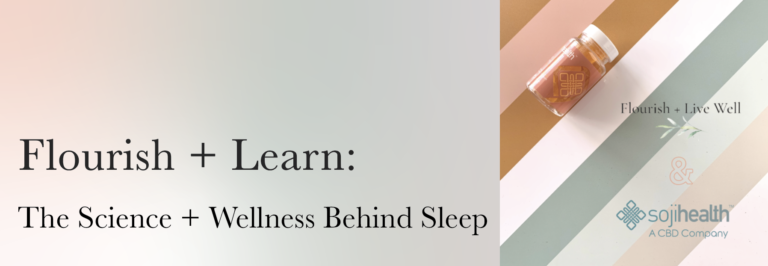This is our next installment in our blog series, Flourish + Learn, in partnership with Soji Health.
This series explores the science behind wellness and CBD through a series of monthly blog posts. In these posts, we offer scientifically backed wellness tips and lessons to help you live your best life, while also learning important definitions, ideas, and information to help you navigate the CBD and wellness industry.
Both Soji Health and F+LW are invested in harnessing the benefits of plants to help our minds and bodies. By teaming up, we are excited to combine our respective expertise and values to make CBD and natural healing more approachable, accessible, and understood.
Sleep is essential to building the body’s immunity and making sure it is operating at full capacity. When we sleep, our body produces a protein called cytokines, which target infection and inflammation, creating an immune response. We also produce T-cells during sleep, which are white blood cells that play a critical role in our immune response to infectious diseases. When the body is sleep deprived, there is a decreased production of these protective cytokines and infection-fighting cells, leaving our immune systems more susceptible to infectious illnesses.
This makes it super important for adults to get enough sleep each night. The optimal amount of sleep is seven to eight hours. However, with nearly 1 in 3 adults struggling with insomnia and other sleep disorders, few manage to get enough rest each night. This has led to a rising interest in sleep aids, particularly holistic sleep aids like THC and CBD. While both can help people fall asleep, there are important distinctions between the two that can impact our immune system and overall wellness.
THC as a Sleep Aid
THC, a psychoactive cannabinoid, is primarily responsible for that “high” feeling and is also known for significantly decreasing the amount of time it takes to fall asleep. But like alcohol, it blocks REM sleep. REM, or rapid eye movement, sleep is a unique phase of sleep characterized by the random rapid movement of the eyes, accompanied by low muscle tone throughout the body, and vivid dreams. REM sleep is important because it stimulates the areas of the brain that help with learning and is associated with increased production of proteins.
In addition to affecting REM sleep, over time people also build a tolerance to THC and will need more THC to keep getting to sleep faster. This ultimately makes THC detrimental to deep sleep and can lead to insomnia when one stops taking it. For these reasons, many users and health professionals favor CBD.
A Case for CBD
CBD shares many of the same benefits and relief associated with THC, without the “high” and negative long-term effects. Through research, CBD has been found to reduce the amount of time it takes one to fall asleep, help people get to REM sleep better, and reduce anxiety- which can help people fall asleep and improve overall sleep quality. As we noted in our last Flourish + Learn post, Flourish + Learn: Boosting Immunity, CBD has also been found to have several immune-boosting qualities, making it a great remedy for sleep and overall immunity and well-being.
We hope you enjoyed this edition of Flourish + Learn and we look forward to sharing the next installment of this series next month
